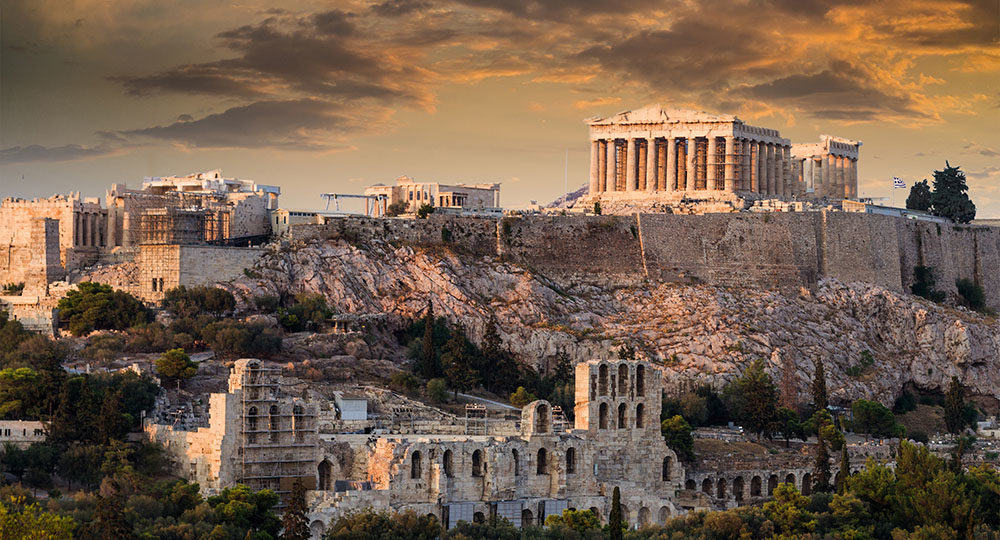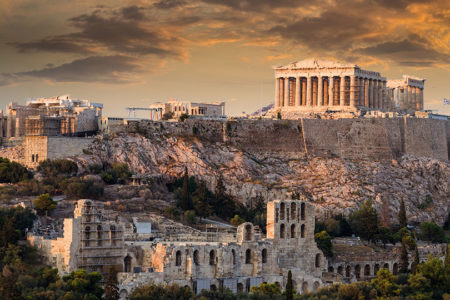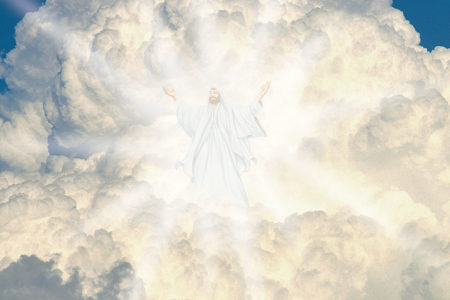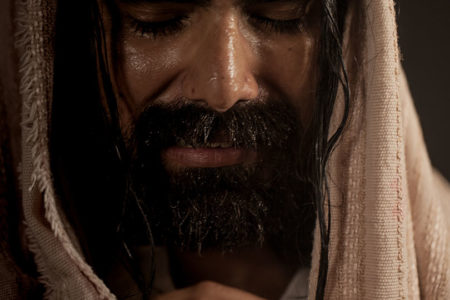Ascending Mars’ Hill
And in that day will I make Jerusalem a burdensome stone for all peoples; all that burden themselves with it shall be cut in pieces (Zech. 12:3).
As negotiators slumped away from the vaunted Camp David and UN millennial summits of last summer, they took with them a keen awareness of how burdensome Jerusalem can be. Though the major players were not astute students of prophetic Scripture, they certainly must have sensed the gist of its message.
For the three principals at the negotiating table, Bill Clinton, Ehud Barak, and Yasser Arafat, nothing but frustration filled the air. President Clinton, at least temporarily, must have seen his muchsought-after Nobel Peace Prize flying out the window. Ehud Barak, after promising to cede much more than most Israelis could tolerate, was, to say the least, deflated. Yasser Arafat, who wanted everything but walked away with nothing, exuded the arrogance toward Israel and the West that radicals in his camp so deeply admire. Each of them must have been mulling over the question, “Where do we go from here?” By all appearances, the sign at the end of the road read “Dead End.”
Going to the Court of Last Resort
With talk of new negotiations, yet another summit, and proposals for backroom deals flying through the air, the issue of Jerusalem stood like an impassable blockade. It was perhaps out of that very frustration that a new—and, given the state of international opinion toward God, revolutionary—idea was put forth. As bizarre as it may sound, the proposition suggests that sovereignty over the Temple Mount be granted to God! The notion apparently was first floated during the Israeli-Palestinian peace talks, where it must have seemed more like a joke than a serious proposal. The impertinent thought that quarrelsome humans could bestow on the Almighty what is His to begin with is bizarre indeed. But there it is. God superintending the Temple Mount in Jerusalem. It sounded good to Ehud Olmert, the mayor of Jerusalem, who said he could live with it. In an interview with foreign journalists, Olmert stated, “The idea of divine sovereignty is something that can be pursued.”
Commenting on Olmert’s statement, The Jerusalem Post reported on August 31, “The idea of putting the area under divine sovereignty has been discussed by senior Israeli and Palestinian negotiators as a possible solution to the most difficult question of sovereignty over the Temple Mount, which led to the collapse of the Camp David talks.”
So beleaguered Israeli and Palestinian negotiators seemed ready to throw in the towel and refer the matter to a higher court. Under such an arrangement, Israel would be in charge of overall security, while Muslim clerics would have autonomy in administrating their own shrines. Those who endorse the plan believe the idea of “divine sovereignty” is a vague enough term to win endorsements from both Palestinians and Israelis. Mayor Olmert believes the arrangement would not alter present positions, just encourage the status quo. In other words, although God is sovereign, we can still wrangle over the details.
But the same problem exists that has dogged this peace process from the beginning.
Whose God would it be? That question, in the final analysis, looms as the big issue.
What the politicians don’t seem to realize is that if God is officially declared sovereign over the Temple Mount, someone will have to determine whose God it will be. Will it be Allah of the Muslims or Yahweh, the God of the Jews? Also, will others come up with a list of potential divine sovereigns? This matter is not to be taken lightly, because when we speak, for example, of the God of the Jews as opposed to Allah of the Muslims, we are not speaking of the same deity. And while the seriously misinformed will loudly and impassionately argue that they are one in the same, they are not.
In his book The Islamic Invasion (Harvest House), Dr. Robert Morey addresses the problem. In his conclusion to the chapter titled, “The Moon God,” he writes the following:
In the field of comparative religions, it is understood that each of the major religions of mankind has its own peculiar concept of deity. In other words, all religions do not worship the same God, only under different names. The sloppy thinking that would ignore the essential differences which divide world religions is an insult to the uniqueness of world religions.
Which of the world religions holds to the Christian concept of one eternal God in three persons? When the Hindu denies the personality of God, which religions agree with this? Obviously, all men do not worship the same God, gods, or goddesses.
The Quran’s concept of deity evolved out of the pre-Islamic pagan religion of Allah-worship. It is so uniquely Arab that it cannot be simply reduced to Jewish or Christian beliefs.1
Ascending Mars’ Hill
Unquestionably, Western culture is turning back to paganism. The matter before us makes the point. It has become anathema for anyone to criticize another’s concept of faith or declare his belief system superior to others.
Early last September the Vatican issued a 24-page document reaffirming commitment to the doctrines of the Roman Catholic Church. The document implied that other religions are, in the Vatican’s view, inferior to Catholicism. A howl of protest arose from world religious leaders, condemning the pope and the proclamation. How dare he diminish the worth or speak judgmentally of any other religion? Weren’t all religions of equal value and stature? Whether one worships a god, an insect, a tree, or a stone—what difference does it make? There is no superior system of faith. Who among us has the right to dare propose that others are wrong or that we are correct? What this argument exposes is that, after 2,000 years, we are once again in Athens, trudging up Mars’ Hill.
Now while Paul waited for them at Athens, his spirit was stirred in him, when he saw the city wholly given to idolatry. Therefore disputed he in the synagogue with the Jews, and with the devout persons, and in the market place daily with them that met with him (Acts 17:16).
The philosophers and intellectuals subsequently took the apostle to a place called Mars’ Hill (Areopagus). There members of the pagan religious establishment met to exchange arguments about their gods and to learn of new ones. If you stand atop Mars’ Hill today, you can look down at the agora, or market, where Paul disputed with the Athenians. An upward view to the right reveals the awe-inspiring Parthenon, a true wonder of the ancient world. The structure housed statues of pagan deities and was designed to represent their glory. In short, Paul was virtually surrounded with every artifice of paganism that his world had to offer.
Then Paul stood in the midst of Mars’ Hill and said, Ye men of Athens, I perceive that in all things ye are very religious. For as I passed by, and beheld your devotions, I found an altar with this inscription, TO THE UNKNOWN GOD. Whom, therefore, ye ignorantly worship, him declare I unto you (Acts 17:22–23).
In Athens every man had his altar and his God. But every man was wrong! Paul, a Jew, declared that they were passing by the only altar that could make a difference. There was but one God and one way to gain His favor.
For in Him we live, and move, and have our being;. . . we ought not to think that the Godhead is like gold, or silver, or stone, carved by art and man’s device. And the times of this ignorance God overlooked, but now commandeth all men everywhere to repent, Because he hath appointed a day, in which he will judge the world in righteousness by that man whom he hath ordained; concerning which he hath given assurance unto all men, in that he hath raised him from the dead (Acts 17:28–31).
Paul proclaimed the resurrected Christ as the only way to redemption and the eternal favor of God. His message did not set well with the majority of his hearers—no better, in fact, than it does today with religious pagans in this new millennium. Nonetheless, the death, burial, and resurrection of Jesus the Messiah is not a negotiable issue. Nor is it but one of many ways to whatever one may define as God. In this fact, the battle was joined; and it is moving toward a consummation.
Bow Down or Die
In our brave new world of religious tolerance stands a false assumption: By accepting every concept of god on the face of the earth, we have at last breached the wall of ignorance and bigotry. We have created a new freedom—a-camaraderie of the liberated global man, unfettered by the old ways or the impediments of esteem-stunting, dark-age religious superstitions.
These new-world dreamers, however, are moving inexorably toward a nightmarish awakening. They are being set up because, when they appear to have their houses in order—as those who lived confidently in the shadow of the Tower of Babel—their worlds will come crashing down.
The Bible teaches that before the Second Advent of Christ, a satanic pretender will come on the scene. We call him the Antichrist. When he appears, there will be one global religion that apparently condones anything and everything that anyone calls god. Will this beast, this pseudo-Christ, join the fraternity? The answer is in the Word of God:
And the king shall do according to his will; and shall exalt himself, and magnify himself above every god, and shall speak marvelous things against the God of gods. . . . Neither shall he regard the gods of his fathers, nor the desire of women, nor regard any god; for he shall magnify himself above all (Dan. 11:36–37).
The portrait is enhanced in 2 Thessalonians 2. This Antichrist, “the son of perdition” (v. 3), takes the spotlight. There on the Temple Mount in Jerusalem, Israel, he says what others have dared not say:
Who opposeth and exalteth himself above all that is called God, or that is worshiped, so that he, as God, sitteth in the temple of God, showing himself that he is God (v. 4).
The world of this tyrantu-surper will have zero tolerance for anyone who embraces any other deity. His credo simply will be, “Bow down or die.” Thus the “I’m okay, you’re okay” New Age religion is not okay after all. And any contemporary declaration of divine sovereignty over the Temple Mount is only a reflection of man’s enduring folly and an obvious reminder of what the God of the Bible promises is yet to come.







